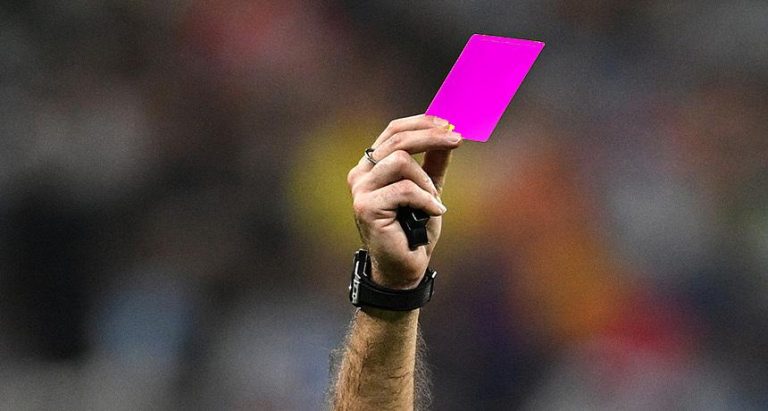Home » Is the Pink Card the Future of Football?

Is the Pink Card the Future of Football?
Is the Pink Card the Future of Football?
The 2024 Copa America is about to witness a groundbreaking innovation: the Pink Card. This revolutionary tool, introduced by CONMEBOL (Confederation of South American Football), prioritizes player safety by enabling an extra substitution for specific situations. Let’s delve into how the Pink Card works and its potential impact on the beautiful game.
Prioritizing Player Wellbeing: The Pink Card Protocol
The Pink Card debuts at the upcoming Copa America (June 20th – July 14th, 2024) in the United States. This allows for a sixth substitution specifically for severe injuries, particularly head trauma or concussions. This stands in contrast to the traditional yellow and red cards used for managing player conduct.
Utilizing the Pink Card
If a player is suspected of sustaining a concussion, the referee or fourth official will show the Pink Card, signifying an additional substitution. This card complements the existing yellow and red cards for managing player conduct.
Maintaining Fairness: Substitutions and Reporting
To ensure a level playing field, both teams’ medical departments must submit a detailed concussion assessment to the CONMEBOL medical commission within 24 hours after the match. The injured player will be immediately evaluated by medical personnel and will not return to the game.
These changes ensure proper documentation and review, fostering a safer environment for athletes.
Benefits of the Pink Card
The Pink Card prioritizes player welfare by allowing an additional substitution for head injuries. This removes pressure on potentially concussed players to stay in the game and ensures they receive immediate medical attention. Teams also retain squad flexibility without being penalized for an unavoidable substitution.
Aligning with Global Trends
The Pink Card aligns with a broader trend in sports regulations that emphasize enhanced safety protocols. Similar measures exist in other sports, and football is joining the movement. The International Football Association Board (IFAB) supports such innovations, allowing Copa America to adopt the rule before its global rollout on July 1st.
The Future of the Pink Card: A New Era for Football?
As the 2024 Copa America unfolds, the Pink Card’s implementation will be closely watched. This innovation has the potential to set a new precedent for player safety in football.
Beyond Copa America: A Global Impact?
A successful Pink Card implementation at Copa America could pave the way for its adoption worldwide. This success might influence other football federations to introduce similar measures, further standardizing concussion protocols across the sport.
Continuous Improvement for Player Safety
The Pink Card is just one step towards enhanced player safety. Ongoing evaluation and adjustments will be crucial, with feedback from medical professionals, players, and teams refining the Pink Card’s implementation for maximum effectiveness.
Conclusion: A Red Card to Player Injuries?
The Pink Card at Copa America 2024 signifies a revolutionary development in football. This rule reflects the sport’s growing focus on player well-being and could set a precedent for other guidelines.
By allowing more substitutions for concussions, CONMEBOL has prioritized the health of players, thereby upholding both competitiveness and safety. The impact of the Pink Card will be closely monitored, potentially ushering in a new era for football regulations.
